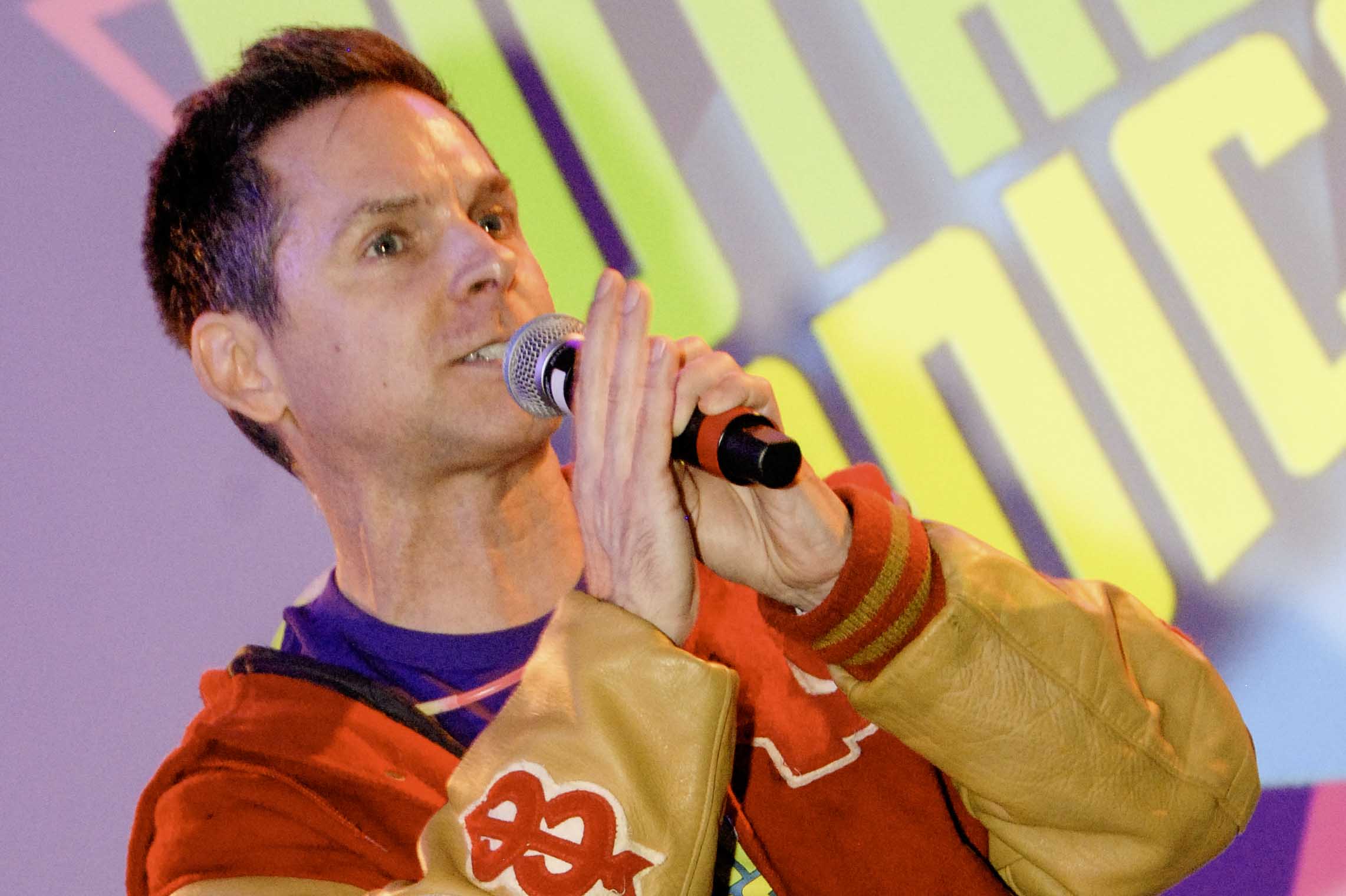The Advocate: Mara Keisling on Trump, the Equality Act, and fighting for trans rights
Mara Keisling has worked too hard and for too long to let Donald Trump undo the progress of transgender rights. She's fighting him every step of the way

Mara Keisling remembers her first thought upon hearing that President Trump, on one summer morning in 2017, had taken to Twitter and proposed banning all transgender people from serving in the U.S. military.
“My gut reaction was: ‘Get to work,'” says Keisling, the executive director and founder of the National Center for Transgender Equality. “I think that’s always the first reaction here.”
For Keisling, every day under the Trump administration is a day to get up and tackle problems with a “can-do” attitude and her natural sense of optimism. On the day of this interview, Keisling had spent her morning on Capitol Hill, meeting with transgender service members, making the rounds to lawmakers’ offices, and appearing with U.S. Rep. Joe Kennedy III (D-Mass.) at a press conference highlighting a House of Representatives resolution condemning the trans military ban. The resolution passed, with all Democrats and five Republicans voting in favor.
“We’re in a hostile environment right now,” Keisling says. “But to have a day where we can do something about that, where we can fight back, where we can stand up, where we can come together and make a difference? That’s pretty fucking spectacular.”
Keisling credits the hard-working, dedicated staff at NCTE for helping her go into each day prepared to do battle against any and all who seek to belittle, subjugate, or deny equal rights to transgender Americans.
“We have such a good staff right now — so smart, so caring, so assertive,” she says. “When President Trump leaked his memo to The New York Times in October, I still remember, it was about 8 in the morning on a Sunday, and by 10 a.m. we were all on the phone, plotting out the ‘We Won’t Be Erased’ campaign.
“And that’s really hard, because most of the people who work here are trans,” she adds. “We know it’s us that he’s attacking, but we also know that we have such a privilege and such an opportunity to fight back, and to lead a fight back, and so that’s always what we focus on.”
Things haven’t always been easy for Keisling. For much of her early life, she was forced to deny her transgender identity, even though she’s apparently known that she was a girl since she was a toddler in 1962.
“I am told by a relative that I came out to my parents when I was about three,” she says. “I do not remember this at all, so I have no idea if it’s true, but I have no reason to think it’s not. This relative said I put on my sister’s Brownie uniform, and came out and said, ‘See, I’m a girl, and I’m gonna be a girl from now on.'”

Keisling’s parents talked her out of claiming to be a girl, not because they were hostile to the idea, but because everybody in society at the time, as she puts it, was “gender innocent.”
“I do not want to give one ounce of grief to my parents,” says Keisling. “They were amazing back then, they are caring and open-minded, but I don’t know what they could have done. There was no information for them. It was: everybody’s either a boy or a girl, and there’s no variation…. And that’s the way society was, that was the default, that was the only option.”
Despite her internal feelings, Keisling remained largely closeted throughout the first 40 years of her life. When she was 30, she first expressed her feelings to a support group, and would occasionally chat online with other transgender people. In 1996, she went to Fantasia Fair — a transgender festival in Provincetown, Mass. — where, for the first time, she felt she could express her identity without judgement.
“I met this person in Provincetown, and I’m ashamed to admit I don’t remember their name, and I didn’t remember it two weeks later. And this person had been such an important point in my life,” she says. “But this person was like me. They were a college professor, and they were six-foot-two, and at the time I was teaching college, and I was six-foot-two. And this person had transitioned, and it just opened me up.”
For the 59-year-old Keisling, the end of the weekend was an emotional rollercoaster, leaving what was a very cathartic experience at Fantasia Fair only to return to a life where she was still closeted.
“I have never been a crier in my life, and I had driven up from D.C., to Provincetown, and had to drive back, and that Sunday I started driving back, and I got about as far as Chatham. I pulled over, and I just cried,” she says. “And then I got to Providence, pulled over and cried. I had to cry in New Haven, and I cried in Tarrytown, and I cried in Scranton, and it was such an incredible thing, and that’s when I decided to transition. And it was not just meeting that one person, it was realizing that there was a community of people like me.”
Over the next three years, Keisling made friends within the local transgender community, and was essentially living dual lives — one at work, where she was not out, and one socially, where she was — as she began to slowly transition. She then started to come out to close friends and family in May 1999. After moving to and living in Harrisburg for two years, she began making connections with LGBTQ activists, eventually being recruited by the Pennsylvania Rights Coalition to lobby on behalf of an LGBTQ-inclusive hate crimes bill. After that, she helped create the Pennsylvania Gender Rights Coalition, marking her official entry into the world of transgender advocacy.
Throughout the years, Keisling has had her ups and downs as an advocate, but approaches her work with tenacity and determination, even in the rough times. She is particularly sensitive to the struggles that transgender children face in life, and dedicates her daily work to ensuring they will be better off.
“Every time I hear a story about a kid who’s been harassed, or a kid who’s now suicidal, or a kid we lost, because we as a society, we as individuals, weren’t able to help them, it is heartbreaking, every single one of them,” she says.
Despite occasional setbacks, Keisling is always ready to take on the next fight.
“I genuinely am an optimistic person, so I’ve always loved every job I’ve had,” she says. “And this is not like any of those jobs. I never thought of this as a job. For the first couple of years, I didn’t get paid. This has been a calling.
“To sit where I am now, in 2019, seeing all the progress that’s been made, that I got to be part of — from when I met with the Senate Minority Leader in Pennsylvania, a liberal Democrat who told me, ‘Mara, look on the bright side, a couple of years ago I wouldn’t have let you in my office,’ to today, where we could see almost 100 members of Congress flying the trans flag outside their offices — is not just an honor, not just humbling, it is something I can be excited about for the rest of my life.
“That I still have anything to give is so exciting to me. That’s what gets me up…. I know that because we’ve created NCTE, we’ve created this trans movement, we’ve created this LGBT movement, that means I can make a difference. If I just get out of bed, I can make a difference, so I can get out of bed. And I’m not even a morning person.”

METRO WEEKLY: It has been 15 years since you were last on our cover. What has been the biggest change in that time for the transgender rights movement?
MARA KEISLING: Really, almost everything. We used entirely different language. I was just reading that article from 15 years ago, and I sound anachronistic to me. Even the words we use have changed, even what we think of as our communities have changed. The LGBT movement is actually an [inclusive] LGBT movement now. In 2004, we hadn’t finished that debate. I happened to be in England a couple of weeks ago, and they’re still having that debate, on whether or not trans people and gay and lesbian people should be in the same community, or should they have separate movements. That’s largely been resolved here. In 2004, it really wasn’t.
Another huge thing that’s changed is, in 2001 — and this was true in 2004 — the most liberal members of Congress wouldn’t even meet with me. I mean, some of them did. I don’t want to say all of them didn’t. My first real meeting was with Congresswoman Jan Schakowsky, who’s still in Congress. But even the most liberal members of Congress were not okay with trans people being in what they saw as gay rights bills. They wouldn’t meet with us.
MW: Nowadays, you’d think that a large number of the Progressive Caucus would want to meet with transgender people.
KEISLING: Today, we were on the hill because Congressman Joe Kennedy had a resolution rebuking the president for his mindless, harmful, and cruel trans military ban, and during the debate, the Speaker of the House spoke on our behalf. The Majority Leader of the House spoke on our behalf. At least two committee chairs spoke on our behalf. I’ll tell you, there were not a lot of committee chairs who would even meet with us 15 years ago, and, later, there was a press conference where there were eight members of Congress.
At the same time, across the street, in the House office buildings, in the Senate office buildings, there are now dozens of members of congress displaying trans flags outside of their office. And when you walk down the hall in the Longworth House Office Building, for instance, you see so many offices that have an American flag, a state flag, and a transgender flag.
For somebody like me, who grew up really believing I was the only transgender person in the whole world, that I was the only one who felt like things weren’t the way everybody was telling me they were, the only one who had this particular kind of shame — because it seemed like a shameful thing back then, because there was no information and no resources — walking down the halls and seeing all these transgender flags was powerful.
I was walking through the Longworth Building today, and met Congresswoman Rashida Tlaib, who is one of these very fierce freshmen, from Detroit. She’s just absolutely wonderful, and she was like, “Mara, I want to do a video for Trans Day of Visibility with you.” And I’m like, “Oh my god, not only will they meet with us if we beg, they’re actually asking if we will do videos so they can show how pro-trans they are.” She actually is extremely pro-trans — or pro-human is what most of these members are — and I think they have, over these 15 years, really come to understand that we’re not some exotic or erotic oddity, we’re real, actual people.
MW: Is the change in attitudes towards transgender people generational, driven by the younger members, or does it signal an evolution by the older guard?
KEISLING: It is a generational thing, for sure. We’ve seen amazing stuff out of the youngest of the new members. But remember, the Speaker of the House and the Majority Leader are both in their 70s, and they are one hundred percent there. And it’s because they are human rights advocates, and caring people, and open-minded, and they learned. Though I can’t tell you that Nancy Pelosi was ever against us. I don’t remember ever asking for a meeting that I didn’t get with her, so I want to be clear.
I really suppose much of America, particularly much of older America — folks in my age cohort — are probably, every now and then, just saying, “Where in the world did all these transgender people suddenly come from?” And it wasn’t sudden by any means. So part of it is generational. Part of it is a lot of hard work, on a lot of people’s parts. Part of it is the trans policy movement, that we’re a part of, has really been super smart, and super assertive. And part of it is technological, by the way, because the Internet has made building communities, and expressing opinions, and responding to expressed opinions a lot easier, and a lot fuller.
Policy work, I think, is super important. I think it’s been amazingly helpful for the trans communities to grow — communities plural — and to come together, and to get what they needed to have fuller lives.
But the most important thing I personally have ever done, as a trans person, and the most important thing any LGBTQ person has ever done, is to educate the people around them, educate their families, educate their coworkers, their classmates, the people they worship with, their neighbors. That is unstoppable. Once people learn that we are human, and we are decent, and we just want to live, people get that. And they can’t unlearn it. Once you have a child who comes out to you as trans, if you’re a decent person, you become a trans supporter.
MW: Nancy Pelosi has made one of her priorities in this congress getting a vote on and passing the trans-inclusive Equality Act. But about 12 years ago, our community had a fight over including transgender people in the Employment Non-Discrimination Act. What’s different about this fight than the one we had in 2007?
KEISLING: First and most obviously, they’re entirely different bills. ENDA had been paired down to just be employment discrimination. It was a super simple bill. Not that the Equality Act is as complicated as the Affordable Care Act. But ENDA was just employment protections. It was super small, super compact, and it was made that way because when Bill Clinton was president, everybody thought, “Maybe we can get it passed through the house and the senate,” and it never passed.
The Equality Act is a much more comprehensive bill that covers seven categories: employment, housing, education, credit, jury service, access to federal funding, and public accommodations. It uses existing civil rights laws to get LGBT people up to the same kind of protections that all people should have in the United States. So that’s the biggest difference.
The second biggest difference is — nobody’s even whispered about a possibility, and they’re not talking about it behind the trans people’s backs, either — there’s no chance any serious player in this fight is ever going to consider taking trans people out.
MW: Walk us through the history behind the ENDA fight.
KEISLING: The history of the LGBT anti-discrimination process in congress has been kind of ugly. The first bill was introduced in the early, mid 70s, like ’73 or ’74. Shortly after Stonewall, but also just three years after trans people like Sylvia Rivera had been very explicitly told, “Beat it. You’re not welcome in the gay rights movement.” So they had that shame going for 20 years, but then in ’93 they cut the bill down to just ENDA, and there was still nobody talking about putting trans people in it except trans people. Finally, in 2005, we negotiated gender identity into the bill, so during that Congress, between 2005 and 2006, there was no ENDA introduced at all, because we were writing the trans-inclusive ENDA. It came out in 2007, but President Bush had already said he’d veto it, and that was a really important part of this fight.
We knew ENDA wasn’t going to become law, so there was all the more reason not to try to tear the community asunder after we had all just worked so hard to put it together. And Congressman [Barney] Frank made a political judgment that we strongly, strongly disagreed with. His judgment was about forward movement. That’s what he said it was. But he did not understand that the “forward movement” would look like backwards movement to everybody.
And it was backward movement, because since he couldn’t take it all the way to the end, and we knew we couldn’t get 60 votes in the senate, we knew this was not going to become law. So it did not make any sense to take trans people out, and it turned out that was a really pivotal movement for the community and the movement. It changed almost everything. It changed how trans people, or how trans advocates, were seen on the hill. It changed how LGBT media wrote about it. It changed how things were funded. As a trans activist in the last 20 years, it is one of the four most important moments in my activist career. Wanna know what the other three are?
MW: That was going to be my next question.
KEISLING: In 2002 and 2003, that’s when the modern trans policy movement really came into being. In that two-year time period, we went from having three percent of the population covered by anti-discrimination laws to passing state laws, and city laws, to protect trans people.
At the time, there was not, as far as I know, a single attorney whose sole job was to do trans policy, and now there are dozens. Lisa Mottet, who is now our deputy director, started the Trans Civil Rights Project at the [National LGBTQ] Task Force, and she was the first director. She was right out of law school. The Transgender Law Center was founded, the Trans Legal Defense and Education Fund was founded, the Sylvia Law Project was founded, NCTE was founded, and many more. That was when we were like, “Yep, we’re gonna coordinate, activate, and win.”
Number two, chronologically, is the 2007 fight over a united ENDA that we just talked about. Third is a big one: the Obama administration, and everything that meant for trans rights, and all of the litigation victories that our allied organizations were having. Then, finally, fourth is North Carolina and HB2.
MW: Why was HB2, North Carolina’s anti-transgender “bathroom bill,” such a big moment, given that people would consider that more of a negative experience than the other three you mentioned?
KEISLING: To put it in historical context, we were just post-Obergefell. The anti-LGBT extremists were disoriented and feeling down about having just been destroyed in the marriage equality war. And they were looking for somebody to raise money off of and hate, and they decided to pick on trans people. They thought there weren’t very many of us, they thought we didn’t have friends, they thought we’d be easy pickings, and we’d be a foothold to get back to somehow reversing the marriage equality thing.
And that’s something weird that I think most people just don’t understand. They still think there’s a chance they’re going to take back gay marriage. They truly believe that. And a big part of that is to just destroy trans people, because they think we’re weak, we don’t have friends, there’s not a lot of us.
So I think HB2 was in the third year of bathroom fights, after Arizona in 2014 and Texas in 2015, when we had the loss with the Houston Equal Rights Ordinance. And in 2016, there were a lot of states we were playing hot potato in, and then this thing passed in North Carolina, and all hell broke loose for the people who don’t like us. Everybody, every legislator, and every governor around the country, watched what happened. They watched so many big companies step up and say, “This is not okay. How can we possibly do business in your state if we can’t promise our employees they’re safe? Why would we expand in your state?”
One of the things that just makes me so angry, is the way those legislative leaders, and that governor said, “We don’t care if children are terrified. We don’t care if parents are terrified for their kids.”
That’s one of the things I don’t understand about President Trump: how can he sleep with immigrant children terrified, with Muslim children terrified, with kids whose parents are in the criminal justice system always terrified, with trans kids terrified, of what he’s doing. I just don’t understand that.
That’s what they did in North Carolina, and every governor in the country — and every future governor in the country — knows that Pat McCrory was the only governor running for reelection that year who lost reelection, and everyone knows it was because of HB2.
And immediately, in other states, when some extremist back-bencher would introduce an anti-trans bill, you would hear people who supported us, and even people who didn’t support us, say: “Why would we North Carolina our state?” It built a kind of reputational power for trans people. And it also pivoted us, particularly in relation to state bills. We’re not out of the woods on that yet, but the last two years have been simpler, because there have been so many governors, and so many legislative leaders, who don’t like us, but are saying, “Why are we wasting time on these bills, when all that’s gonna happen is it’s gonna hurt economic development, it’s gonna hurt tourism, it’s gonna hurt our reputation?”
No legislator in the country is hearing from lots of constituents who are saying, “We must do something about the transgender bathroom problem,” or, “We must do something about trans kids playing sports.” This is not what people are talking about at their dinner tables, and when you have a state like South Dakota, which has only a 40-day legislative session, and every year they have to go through three, four, six anti-trans bills, South Dakotans start saying, “Why is our legislature wasting time on this?”
MW: We’ve seen a number of stories dealing with transgender chidlren, whether it’s a lawsuit over being able to use the bathroom, or Alliance Defending Freedom coming in to block a pro-LGBTQ school board policy, or even a case out of Oklahoma, where a transgender girl literally received death threats from adults. When you hear those stories, how does that make you feel?
KEISLING: One of the truly great joys and honors of my activist career, has been all of the trans people I’ve gotten to meet, and particularly all of the amazing trans kids I’ve gotten to meet, some of whom are now adults.
This past Tuesday evening, I was in a small town in South Dakota, and I met a 12-year-old, who a year ago was suicidal, who was taken to a hospital, and very explicitly explained to the hospital that the suicidality was related to the bullying they were facing at school, about being trans, and the hospital just made it worse.
They insisted that this person, who identifies as a young man, or a boy, be roomed with a girl. They insisted that when they separate everybody for recreation, into boys and girls, he had to go with the girls. And then, in just a tremendous act of “what the fuck would anybody do this for,” they separated the kids into boys and girls for snack time, and they forced this little boy to be with the girls.
It made the situation so much worse that this kid had to be taken out of the hospital where they were for treatment, because they weren’t safe, because they were being told, implicitly, that they were wrong. They weren’t a boy, they were a girl. They were being told it was shameful, they were being told it was wrong. And their suicidality was not because they were trans, it was because of how they were treated because they were trans, and here they were at a place that thought of itself as a helping institution, where it was being messed up.
The punchline to this story, is there was another kid that day who is 13 — and this was a year ago, so the children were 11 and 12 at the time — who was a friend of the 12-year-old, and said, “That is horrible what happened to you. We should do something about it.”
They told me this story the other day, and I was just so amazed. They made a PowerPoint presentation. They found out who was in charge of the hospital, demanded a meeting with the CEO and a bunch of vice presidents, they did a PowerPoint presentation, put on suits and ties, and went and did a [sensitivity] training [session]. That is a goddamn miracle, that a 12-year-old who had just been through that much pain, that much danger, that much disrespect, that he and his buddy would say, “We’ve got to do something so this doesn’t happen to anybody else.”
When I graduated from high school in 1977, I don’t believe there was a single out trans kid in any school in the United States. And now I’m meeting 12-year-olds who have other trans kids in their school. I met a high school student recently who was one of 10 out trans men in an all-girls Catholic school. For somebody like me, who didn’t even have gay kids coming out in my high school in 1977, that is a remarkable shift. But we have an absolutely sacred responsibility to protect those kids. Now we have to make it possible for them to survive and thrive.
MW: Earlier, you proposed the question, “How can President Trump sleep at night when he is scaring children, doing all these harmful things?” Let me turn the question on its head: What keeps you up at night, what are you most concerned about?
KEISLING: Are we on the right path? One of the curses of thinking you have a responsibility to do good work is that you have to have confidence that the work you’re doing is good. And that’s not as easy. If you’re money motivated, if you have your job to make money, there’s a scorecard. And right now, we’re in the midst of so many societal and political changes. How is what we’re doing impacting what we will have to do next? As we work on policies, we have to be very careful that we’re not setting up other kinds of tragedies down the road.
The thing that upsets me the most is that President Trump is actually doing damage to real people’s lives. He is causing real people’s lives to be over. There are body bags involved with just the horribleness that is President Trump’s administration, and I know we’re gonna get through it, as a whole, but I know there’s a lot of people who aren’t gonna get through it. And there are a lot of people whose lives will be significantly diminished.
And then I worry, how is he gonna change who we are as a community? Are we going to be less compassionate because he is so uncompassionate? Are we going to be less optimistic, because he’s taken our optimism away? I am horrified that there are so many trans people out there who see the downward trend of the Trump administration on trans policy, and think that we’re going down, and we’re gonna hit the ground. Whereas somebody of my age — who has the luxury of having lived all alone with this fight throughout the ’60s, ’70s and ’80s — can see that the line graph of our progress was flat lining for most of my life, and in the last 20 years I’ve seen nothing but upward progress until Trump took it down a little bit, and now we are fighting him tooth and nail.
Everything he does, we try to stop it — and we’ve stopped things. We’ve tried to slow them down when we can’t stop them — and we’ve slowed them down. It’s two years later, and they’re just starting to get the trans military ban ready to be up and running. When we can’t slow it down, we try to mitigate the damage, and we’ve been able to do that in some instances. We always try to make them pay politically.
We make sure that every time he attacks trans people, he comes out weaker, and we come out stronger as a community. And last, but not least, we prepare to fix it later. We, as NCTE, and as a community, know how to do federal advocacy now. And when there’s once again a decent president, whether it’s a Republican or a Democrat, we will know how to fix all of these things he’s tried to break.
For more information on the National Center for Transgender Equality, visit www.transequality.org.
Support Metro Weekly’s Journalism
These are challenging times for news organizations. And yet it’s crucial we stay active and provide vital resources and information to both our local readers and the world. So won’t you please take a moment and consider supporting Metro Weekly with a membership? For as little as $5 a month, you can help ensure Metro Weekly magazine and MetroWeekly.com remain free, viable resources as we provide the best, most diverse, culturally-resonant LGBTQ coverage in both the D.C. region and around the world. Memberships come with exclusive perks and discounts, your own personal digital delivery of each week’s magazine (and an archive), access to our Member's Lounge when it launches this fall, and exclusive members-only items like Metro Weekly Membership Mugs and Tote Bags! Check out all our membership levels here and please join us today!
























You must be logged in to post a comment.